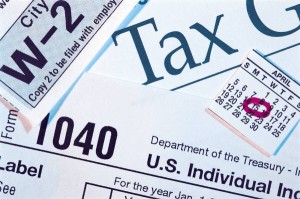Tax deductions for writers is one of the topics that gets asked about a lot. I’ve always been a bit leery about writing a list of writer deductions because things are always different for different situations. However, the truth is that many IRS deductions for writers are fairly standard in that most writers qualify for the same general kinds of tax deductions. Therefore, I’ve decided to throw caution to the wind and jump right in.
Well… maybe throwing caution to the wind is a bit much. Let’s start with a tiny bit of caution.
IRS Deductions Writers
 First of all, in order to take any writer deductions, you have to have a writing business. That is, your writing needs to be as a business, not as a hobby.
First of all, in order to take any writer deductions, you have to have a writing business. That is, your writing needs to be as a business, not as a hobby.
What is the difference between a writing hobby and a writing business? That’s a whole article on its own. But, the key difference between a hobby and a business, according to IRS rules, is a profit motive. In other words, the purpose of your writing must be to make a profit. That doesn’t mean that you DO have to make a profit, the reason you are writing, needs to be to make a profit. Making a profit does not have to be the ONLY reason you are writing. So, if you are writing because you love it, AND you are doing it to make money, then you are a business. Obviously, there is a bit more to it than that. Talk to a tax professional, or do some other research if you aren’t sure.
If you DO make money, you are golden. According to IRS regulations, if your business makes a profit during three out of the last five years, then you have a “safe harbor” for considering your writing a business. In other words, if you are actually making money, then the IRS can’t try and say that your business is just a hobby. This is one of the few times that the government actually make sense. After all, if you’re making money, then you must have a “profit motive.” Or, as the Joker says, “If you’re good at something, never do it for free.”
Once you’ve established that your writing is a business, then all that’s left is knowing what you can and can’t deduct. Before we get to the list, there is one more piece of the puzzle. Technically, you only get to deduct the part used for business. Obviously, this works best if whatever you are deducting is used “100 % for business.” Although that an actual standard, keep in mind that the reality is that even if you work for someone else, even if you work 8 to 5 in an office, very little in this world is one-hundred percent. That person in the cube checks the weather on that business computer. That person in the cube keeps pictures of his kids, and a Nerf gun on his desk. That person in the cube uses his cell phone to call his wife, the printer to print out recipes, and the fax machine to fax in forms to those stone-age companies that still want stuff faxed to them. In other words, don’t try deducting your kids’ iPad, but you don’t have to be a robotic zealot about that 100% either.
What Writers Can Deduct
So, without any further ado, here is a list of items that most writers MAY be able to deduct for use in a writing business. This is obviously not a complete list. These are for general knowledge only, and not specific, individual tax advice. You are responsible for understanding and making your freelance writing tax deductions properly and legally. In other words, don’t try and blame me if Uncle Sam doesn’t like your tax strategies.
Writing Deductions
- Home Office Deduction for Writers– there are a lot of rules about this one, but if it is your own office (and not shared with something non-business) and, as we’ve already established, you are a legitimate business, a home office is a good deduction to take. — As part of this deduction, you can deduct part of your utilities. — Keep in mind there is a potential claw back of the depreciation part of this deduction when you sell a house with a home office deduction used.
- Office Furniture – desk, chairs, file cabinets, bookshelves, etc.
- Computers, Laptops, Netbooks, Chromebooks
- Printers, scanners, fax machines, phones
- Toner, printer ink, cartridges
- Paper, pens, pencils, notebooks, calendars
- Disks, USB drives, external hard drives (backups)
- Websites, domain name registrations
- Internet connectivity, phone service, cable (if used for business)
- Books, magazines, research materials
- Mileage driven for business purposes, including meetings with potential clients (even if they don’t become clients) and research
- Subscriptions, professional associations or dues
- Classes, courseware
- Professional certification exams
- Backups
There are tons more, of course. I’ll try and add to this list as things occur to me. In the meantime, keep your receipts for ANYTHING you buy for your business. It’s a very good possibility it is deductible in some way.
1 thought on “Freelance Writer Tax Deductions”